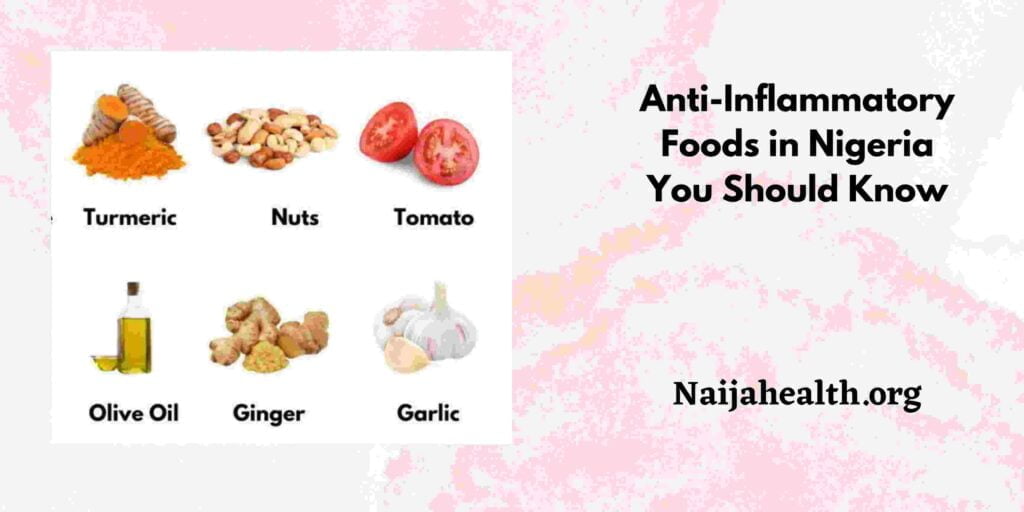
Anti-Inflammatory Foods in Nigeria
Inflammation is a natural response of the body’s immune system to protect itself from injury or infection. However, when inflammation becomes chronic, it can lead to a variety of health problems.
By exploring the abundance of anti-inflammatory foods found in Nigerian cuisine, we can uncover a treasure trove of natural remedies to combat chronic inflammation and promote optimal health.
Anti-Inflammatory Foods in the Nigerian Diet
The Nigerian diet is a treasure trove of anti-inflammatory foods that can help improve health and well-being. By incorporating these foods into our daily meals, we can harness their potential to fight chronic inflammation and promote overall health.
Let’s explore some of the main anti-inflammatory foods commonly found in the Nigerian diet:
- Fruit
Nigerian cuisine features a variety of delicious fruits that not only satisfy the palate but are also rich in antioxidants and anti-inflammatory compounds. Oranges, pineapples, watermelons and papayas are great choices due to their high content of vitamin C and other beneficial phytochemicals. These fruits help reduce inflammation and support a healthy immune system.
- Vegetable
Nigerian cuisine is full of vegetables with powerful anti-inflammatory properties. Ugwu (grooved pumpkin) is a leafy green popular in Nigerian cuisines, rich in vitamins A, C and E, as well as minerals like iron and potassium.
Other vegetables like ewedu (jute leaf), bitter leaf, and garden egg are also known for their anti-inflammatory benefits. Including many of these vegetables in our meals can provide a nutrient-rich, anti-inflammatory diet.
- Herbs and spices
Nigeria’s culinary tradition incorporates a variety of herbs and spices that not only add flavor but also provide anti-inflammatory properties. Turmeric, known as “ata’ile pupa” in Yoruba, contains curcumin, a potent compound with proven anti-inflammatory effects.
Ginger, garlic, cloves and cinnamon are commonly used in Nigerian cuisine and have been recognized for their ability to reduce inflammation. Adding these herbs and spices to our dishes can improve their nutritional value while promoting overall health.
- Healthy fats and oils
Although fat is often associated with inflammation, choosing the right fats is essential to a healthy diet. In Nigeria, traditional sources of healthy fats include palm oil and coconut oil. Palm oil contains tocotrienols and carotenoids, which have anti-inflammatory properties.
Coconut oil contains medium-chain triglycerides (MCTs) that have been linked to reduced inflammation. Using these oils in moderation can be part of a balanced, anti-inflammatory diet.
Nigerian Native Ingredients with Anti-Inflammatory Properties
Nigeria is blessed with a wealth of indigenous ingredients that not only add richness and flavor to traditional dishes, but also have remarkable anti-inflammatory properties.
Let’s explore some of these ingredients and their potential benefits:
- Palm oil
Palm oil, derived from the fruit of the oil palm tree, is a staple in Nigerian cuisine. It contains tocotrienols and carotenoids, which have anti-inflammatory properties. Consuming palm oil in moderation as part of a balanced diet can help reduce inflammation in the body.
- African velvet tamarind (Tsamiyar kurm)
Known as Tsamiyar kurm in Hausa, African velvet tamarind is a sour fruit that grows in West Africa. It is rich in antioxidants, including vitamin C, which can help fight oxidative stress and reduce inflammation. This fruit is commonly used in traditional medicine to relieve symptoms associated with inflammation.
- African Spinach (Efo tete)
African spinach, known locally as Efo tete, is a green leafy vegetable widely consumed in Nigeria. It contains many essential nutrients, including vitamins A, C, and K, as well as minerals like iron and calcium. The presence of these nutrients, along with phytochemicals, contributes to its anti-inflammatory properties.
- African Carob (Iru/Dawadawa)
African carob, known as Iru in Yoruba and Dawadawa in Hausa, is a traditional condiment made from fermented carob seeds. It is often used to enhance the flavor of soups and stews. Besides its stimulating qualities, African carob contains antioxidants and anti-inflammatory compounds that may support a healthy immune system.
- Garden Egg
African eggplant, also known as garden eggplant, is a popular vegetable in Nigeria. It comes in a variety of colors and sizes and is rich in fiber, vitamins, and minerals. Garden eggs contain anthocyanins, which are potent antioxidants with anti-inflammatory properties. Regularly eating garden eggs can help reduce inflammation in the body.
Incorporating Anti-Inflammatory Foods in Nigerian Recipes
Incorporating anti-inflammatory foods into Nigerian recipes is a great way to add flavor while boosting health and well-being.
Here are some traditional Nigerian recipes that incorporate ingredients known for their anti-inflammatory properties:
Soup of squash (Ugwu) and bitter vegetables
Ingredient:
- Pumpkin leaves (ugwu)
- bitter leaves
- Vegetables of all kinds (water leaf, spinach, …)
- Protein of your choice (fish, chicken or beef)
- palm oil
- Onion
- Garlic
- spice cube
- Peppe
- Salt
Instruction:
- Wash and finely chop vegetables, including squash leaves and bitter leaves.
- Heat palm oil in a pan and sauté the diced onion and garlic until fragrant.
- Add protein and cook until golden brown.
- Add water, seasoning, pepper and salt to taste. Simmer until the protein is almost cooked.
- Add chopped vegetables and cook until tender.
- Adjust seasoning if necessary.
- Serve the soup with a side dish of your choice: mashed yams, eba, or rice.
Jollof Turmeric Spicy Rice
Ingredient:
- Rice
- Tomato
- Onion
- Garlic
- Ginger
- red bell pepper
- Scotch pepper (optional)
- Turmeric powder
- Curry powder
- bay leaf
- Vegetable oil
- Salt
- spice cube
Instruction:
- Blend tomato, onion, garlic, ginger, red pepper and Scotch pepper into a puree. Heat vegetable oil in a pan and sauté the diced onion until golden.
- Add tomato mixture and cook until sauce thickens.
- Add turmeric, curry powder, thyme, bay leaf, salt and seasoning. Mix.
- Add the washed rice and stir until the grains are coated in the sauce. Add water (use proper rice/water ratio) and bring to a boil.
- Reduce heat, cover pan and simmer until rice is cooked and bubbly.
- Let the rice rest for a few minutes before scooping it up with a fork.
- Serve the Spicy Turmeric Jollof Rice with your favorite side dish: grilled chicken, grilled vegetables or a salad.
Grilled fish with ginger and garlic
Ingredient:
- Whole fish (tilapia, catfish or mackerel)
- ginger powder
- Garlic mixture
- Lemonade
- Olive oil
- Salt
- Black pepper
- chopped onion
- Fresh herbs (thyme, parsley or basil)
Instruction:
- Wash fish, cut diagonally on both sides. In a bowl, mix together the ginger, garlic, lemon juice, olive oil, salt, and black pepper to make the marinade
- Rub the marinade over the fish, making sure the marinade soaks into the cuts
- Place the fish on a baking dish or on a wire rack
- Sprinkle sliced onion and fresh herbs over fish.
- Preheat oven or oven to medium-high. Grill or broil the fish for about 10 to 15 minutes on each side or until cooked through and golden brown.
- Serve grilled fish with ginger and garlic accompanied by steamed vegetables or a fresh salad.
FAQs
What is chronic inflammation?
Chronic inflammation is a persistent, low-grade inflammatory response in the body that can last for a long time, often months or even years. Unlike acute inflammation, which is a normal and beneficial response to injury or infection, chronic inflammation can contribute to various health problems, such as cardiovascular disease, arthritis and diabetes.
Why is it important to incorporate anti-inflammatory foods into the diet?
Consuming a diet rich in anti-inflammatory foods can help reduce inflammation in the body, support a healthy immune system, and reduce the risk of chronic disease. Anti-inflammatory foods provide essential nutrients, antioxidants and bioactive compounds that fight inflammation and promote overall health.
Can anti-inflammatory foods cure inflammation?
While anti-inflammatory foods can help reduce inflammation in the body, it’s important to note that they cannot completely cure inflammation, especially in cases of chronic or severe inflammation. However, incorporating these foods into a balanced diet, along with other healthy lifestyle habits, can help control inflammation and promote overall health.
Are there any side effects to eating anti-inflammatory foods?
In general, anti-inflammatory foods are safe to eat as part of a balanced diet. However, some people may have allergies or sensitivities to specific foods. It’s important that you listen to your body and consult a healthcare professional or registered dietitian if you have any specific concerns or needs about the diet. eat and drink.
Can I rely on anti-inflammatory foods alone to control inflammation?
Along with a healthy diet, other factors such as regular exercise, stress management, quality sleep, avoiding smoking and excessive alcohol intake are important for effective inflammation control.
Can I find anti-inflammatory foods outside of Nigeria?
Yes, many anti-inflammatory foods are widely available outside of Nigeria. Fruits, vegetables, herbs and spices with anti-inflammatory properties can be found in many different cuisines and cultures around the world.
While there may be regional variations, foods like turmeric, ginger, garlic, green leafy vegetables, and colorful fruits are generally recognized to have anti-inflammatory benefits in different areas of the body. world.
Conclusion
Incorporating anti-inflammatory foods into the Nigerian diet offers a delicious and holistic approach to promoting health and well-being. Nigeria’s rich culinary tradition offers a variety of ingredients known for their anti-inflammatory properties. By using native fruits, vegetables, herbs, spices and ingredients, we can harness the power of natural remedies to combat chronic inflammation.
It’s important to remember that controlling inflammation requires a holistic approach. Incorporating anti-inflammatory foods into our diets is only one piece of the puzzle. Regular exercise, stress management, good sleep, and avoiding unhealthy habits are equally important factors in maintaining a healthy lifestyle.



Be the first to comment